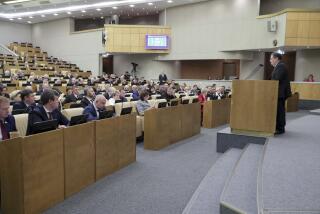Soviet Lawmakers OK New Banking System : Economics: Proposed laws, modeled on the West, would strip the state’s control over monetary policy.
- Share via
MOSCOW — Soviet lawmakers gave approval in principle Tuesday to a new Western-style banking system, breaking the decades-old state stranglehold on everything from money supply to family savings accounts.
The new banking laws, expected to take effect by next year, would strip the government of its control over monetary policy and allot the national bank a role similar to that of the Federal Reserve System in the United States, with powers to issue money and set interest rates.
The legislation also would shore up the myriad commercial banks just beginning to appear here now that communism is yielding to capitalism; no one talks, even theoretically, about old Marxist dreams of doing away with money altogether.
With billions of extra rubles clogging the Soviet economy and many of the country’s 15 constituent republics fighting to issue their own money, “the (national) bank should be central and it should be tough,” said Victor V. Gerashchenko, the Soviet Union’s current chief banker.
“It should have one currency and one policy,” he told reporters, although the new system also would give the republics’ banks virtual independence on everything except currency and issuing money.
Initial approval by the Supreme Soviet, the country’s legislature, for the revamped banking system is the Soviet Union’s latest lurching move away from central planning and toward a market-driven economy.
The proposed new banking system, Supreme Soviet spokesman Arkady A. Maslennikov said, “is the first practical step toward dismantling the command-administrative system,” as the old economic system is known.
Unable so far to forge a unified plan for radical economic reform, President Mikhail S. Gorbachev has begun bringing in changes piecemeal and, recently, by decree. He has ordered the latest compromise version of an overall reform program--the eighth--to be ready by Monday.
The parliament of the vast Russian Federation, under the leadership of the outspoken reformer Boris N. Yeltsin, voted Tuesday to introduce its own, more radical economic reform plan Nov. 1.
Russian Premier Ivan S. Silayev warned the Kremlin not to get in the program’s way.
“If our program is not adopted, we will need other measures, right up to extreme ones, to secure it,” he said, without specifying what action his government might take.
The rebellious Russian republic brought on a major clash with the Kremlin this summer when it asserted control over all its own banking institutions, including its gold reserves. Gorbachev declared the action illegal, and the Russian government backed down; Yeltsin and Gorbachev later met and agreed to prevent such crises in the future.
Gerashchenko said bank officials are trying to prevent the state bank from becoming a political pawn in such struggles between the republics and Moscow and to make it an independent, stabilizing force.
“We’re trying to say, ‘Nobody should give commands to the bank,’ ” he said.
Gerashchenko said Gorbachev’s next economic decree, which has been disclosed but not yet formally issued, will lower the official value of the ruble from about $1.60 to 50 cents in commercial transactions. The new exchange rate will apply primarily to the sales and purchases by Soviet firms engaged in foreign trade.
According to the proposed banking laws, the new central bank also would license commercial banks, which now number more than 100, to engage in foreign-exchange deals, which until now had been the exclusive right of state banks.
In its present form, the central bank, known as Gosudarstvenny Bank or Gosbank, controlled virtually every financial transaction in the Soviet economy.
It channeled all taxes to the government, parceled out government funds to recipients and oversaw savings accounts and loans.
But it was also part of the government and subservient to the Council of Ministers. When government agencies overspent their budget, the bank was generally ordered to use its resources--in effect, channeling savers’ money--to cover the deficits; when that was impossible, it issued more money.
In the future, the bank will only answer to the Supreme Soviet, and the Council of Ministers will no longer be able to subsidize government operations from the bank’s funds. The strong representation of the 15 republics on its board will give the bank a new federal character as well.
More to Read
Sign up for Essential California
The most important California stories and recommendations in your inbox every morning.
You may occasionally receive promotional content from the Los Angeles Times.










